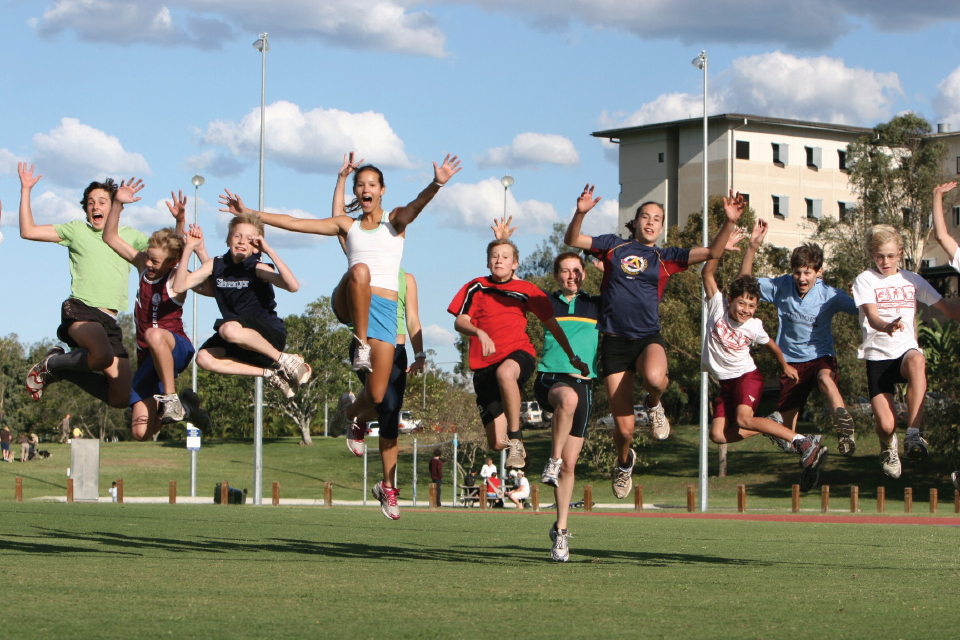PHIT America: Fighting the Inactivity Pandemic

Despite the excruciating Texas heat, the trails in central Austin welcome hordes of runners, joggers, and friendly walkers on a daily basis. Lady Bird Lake overflows with schools of paddleboarders, kayakers, and rowing teams. Packs of cyclists navigate the streets of downtown alongside vehicles, and a new gym or fitness studio seems to crop up every day. The heart of this town beats with the vigor and energy of its active residents, and yet the threat of obesity looms larger every day.
Pockets of health and wellness exist throughout the country in cities such as Austin, but the effects of obesity are of such epic proportions that no region is isolated from the consequences. In 2005, one third of the world population was estimated to be obese, and groups trying to curtail the growth of this epidemic have sprung up around the United States. One in particular is setting itself apart from the crowd.
PHIT America is dedicated to improving national health by combating inactivity rather than focusing on other, more popular factors such as nutritional education. PHIT stands for “personal health investment today,” and founder Jim Baugh has stated that he feels a sedentary lifestyle is much too common. “Everybody’s talking more or less about eating better and eating properly,” said Baugh. “The food and beverage companies are really taking it on the chin as being the cause of obesity, and that’s really not true. The biggest problem that we’re facing in America is the inactivity pandemic.”
Baugh is a veteran of the sporting goods industry—his career has encompassed being president of Wilson, the sporting goods giant, and the Tennis Industry Association—and he’s passionate about the vital role that sports and activities should play in the effort to eliminate obesity. “It’s so easy to go home and be on your computer, use social media, and not move and be inactive,” Baugh said, stressing that, to make an impact in this world of couch-friendly distractions, Americans must be constantly engaged regarding the issue.

Founded in 2013, PHIT utilizes four key strategies to promote the value of an active lifestyle: education, legislation, local programming, and community influence. Baugh, a member of the Sporting Goods Industry Hall of Fame, said his vision for PHIT America sprouted years ago, the seed planted when he was a graduate school student and growing throughout his successful career. “I always thought there was a higher, more important message,” he recalled of the potential for influencing Americans.
The staggering statistics on obesity support Baugh’s instinct to do more. In 2009, 63 percent of Americans and 66 percent of Texans were overweight or obese. The World Health Organization (WHO) defines obesity as an abnormal or excessive accumulation of fat, and links obesity and being overweight to more deaths worldwide than being underweight—meaning that more people die from overeating than from starvation. Upon founding PHIT America, Baugh said, “We launched this campaign by saying enough is enough.”
In the areas in Texas where fitness might be the norm, that 66 percent obesity rate may seem to have little impact. But obesity slows down the economy and drives up healthcare expenses, and educating Americans about the reality of those consequences is PHIT’s first approach to making an impact. The goal is to have a complete mass media campaign to show why fitness deserves a higher priority. “Just like there are education programs for anti-smoking, we need to have an education program for getting America more active,” explained Baugh.
Passing pro-physical activity legislation is PHIT’s next key strategy. WHO’s research shows that every dollar spent on physical activity generates a $3.20 saving per person in medical expenses. PHIT estimates that $190 million in yearly added medical expenditures is related to obesity; given these staggering costs and the amount of money to be saved through preventative physical activity, the organization has created the PHIT Act, which would allow Americans to use pre-tax medical accounts for physical activity expenses. Support for the PHIT Act is convincingly bipartisan, with 22 Democrats and 23 Republicans signed on as co-sponsors of the bill.

PHIT acknowledges that embracing an active lifestyle is most likely to occur with the help of families, communities, and schools. PHIT partners with KIDS in the GAME, a nonprofit supporting physical education and community-based sports programs designed to get children active, playing sports, and increasing their fitness. It’s an approach designed to give at-risk youth an opportunity to thrive and grow in an active community. “We’re trapped in the inactivity world, and we’ve got to keep pushing people out of it,” said Baugh. PHIT supports other initiatives, such as the Mayor’s Fitness Challenge, a Biggest Loser-type, citywide competition, and boasts their own searchable online database of local sports and fitness activities as a resource.
When Baugh set out to create PHIT America, he recruited companies and organizations from the sports and fitness industry to join his crusade. This turned into an alliance of more than 150 sponsors. Individuals who shared Baugh’s passion also wanted to contribute to the cause. Eventually, college coaches such as University of Texas Pan-American head basketball coach Dan Hipsher joined P.E. teachers and fitness professionals as official PHIT Ambassadors. Celebrities, including golfing legend Gary Player and NFL Hall of Famer Herschel Walker, signed on to bring the movement to new heights. This final strategy—assembling influencers from the community—continues to grow every day.
Within PHIT America’s movement, there is a place for every concerned company and individual to play a part. The current culture of inactivity affects everyone, and more than anyone else, active individuals are poised to make a positive impact on those around them. “People who are active can be conduits, can be communicators, can be motivators to get people active,” Baugh said. He gives credence to the adage—if we all do a little, we can achieve a lot—and maybe, in this case, lose a lot in the process.






